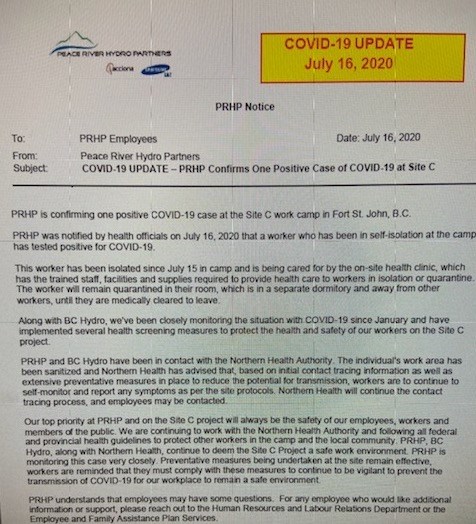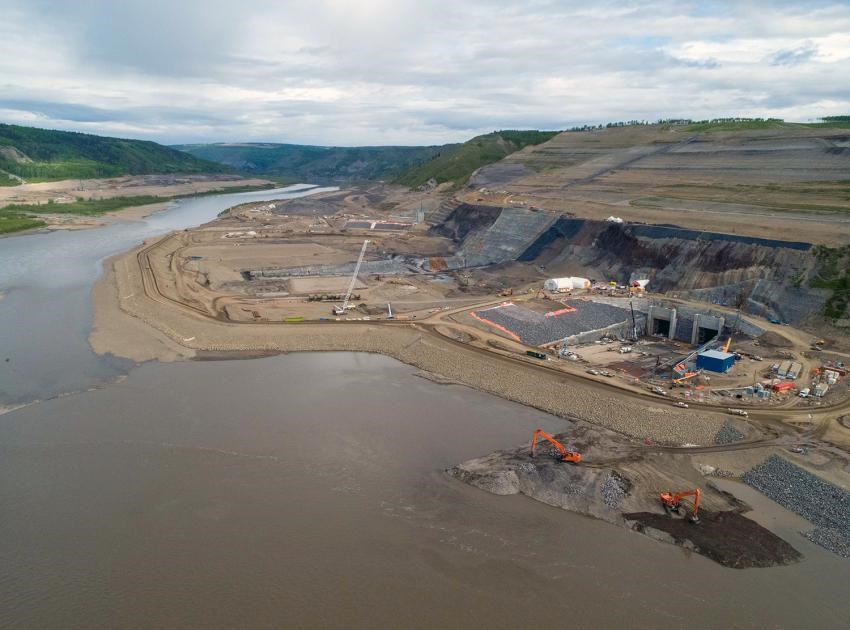A Site C worker from Alberta has tested positive for COVID-19, and four other close contacts have been put into quarantine at the work camp in Fort St. John.
BC Hydro said Friday the worker arrived on July 13, and immediately self-isolated after receiving their test results from Alberta Health Services on July 15. A second test by Northern Health confirmed the worker was positive on July 16.
"The worker is being cared for by the on-site health clinic, which has the trained staff, facilities and supplies required to provide health care to workers in isolation or quarantine," BC Hydro said in a release July 17.
"The worker will continue isolating in their room, which is in a separate dormitory and away from other workers, until they are medically cleared to leave."
It's the first test positive reported at the dam project since the COVID-19 pandemic was declared in early March. There are currently 1,446 workers at the camp outside Fort St. John, and five are reported to be in self-isolation.
Provincial health officer Dr. Bonnie Henry said Friday afternoon the worker was exposed to the virus in Alberta, and had a "very small number" of contacts at the site who have been identified, and put into isolation to be monitored.
“This person had very limited contacts after their recent return to the camp," Dr. Henry said. "They’ve had no contact with any of the communities in that area."
BC Hydro said the same: "Prior to self-isolating, the worker had not left the camp or had any interaction with the local community."
Construction crews were first notified in a site-wide memo on Thursday, and at meetings Friday morning. The worker is from Edmonton, and works at a concrete plant at the dam site, according to sources.

BC Hydro has already implemented safety protocols in recent months. That includes mandatory temperature checks and a Ministry of Health COVID-19 self-assessment of symptoms and recent travel before being allowed on to site.
Dr. Henry couldn't say when or why the worker was tested, or whether they had disclosed they had been tested prior to returning to the site. It's not known what, if any, symptoms the worker may have had.
“I do know that as soon as the person received the information that their test was positive, they immediately reported it,” Dr. Henry said, adding there will be changes to require testing disclosure. "That will be a question that will be added to the questions that are asked to everybody who comes into the industrial camps going forward."
BC Hydro says changes to its protocols are expected.
"Our pre-screening protocol is modelled after the federal and provincial pre-screening travel protocols," said spokesman Dave Conway.
"The pre-screening protocols were applied to this individual and it did not result in the worker being screened out for travel or access to site. We are working with our contractors to enhance these protocols based on the outcome of this case."
Testing at the work camp is being done in line with public health guidelines, Conway said. Workers are being reminded to self-monitor and report any symptoms.
A significant portion of the dam's construction was shut down in March for the first two months of the pandemic, and restarted in mid-May.
Construction crews are working to a September deadline to divert the Peace River and begin building the kilometre-long earthfill dam across the river channel. "Work safely continues as planned," Conway said.
The potential for an outbreak at Site C has been an ongoing concern since the pandemic was first declared, prompting the City of Fort St. John to declare a state of emergency. Mayor Lori Ackerman had few details on Friday.
"Our discussions with BC Hydro is that they have the capacity to deal with that inside their camp. If that person needs hospitalization, then Northern Health will deal with that," Ackerman said.
The city hospital is one of three across northern B.C. designated to care for patients with COVID-19, which can develop into a severe and fatal pneumonia. Its most common symptoms are dry cough, tiredness, and fever. The disease is caused by a new respiratory virus first reported in China at the end of 2019.
BC Hydro has been regularly reporting the number of workers at camp and those in isolation since March. The isolation dorm saw its highest number of workers at one time on March 23, with 16.
BC Hydro says workers with symptoms of sneezing, sore throat, muscle aches, headaches, cough fever or difficulty breathing are required to self-isolate for 10 days.
Workers who need to self-isolate are quarantined to a 30-room dorm at the work camp. BC Hydro says it will not move workers into Fort St. John to self-isolate, and another 120 rooms in four other dorms can be used as necessary.
That case isn't being added to the numbers for the Northern Health region. The worker is from Alberta and the province is recording those numbers separately, the health authority said.
Dr. Henry announced three new test positive cases in Northern Health on Friday, bringing the vast region's case count to 68.
The three cases are all in different communities, and at least two are related to travel, one of them from out of province, she said.
This is a developing story.
Email Managing Editor Matt Preprost at [email protected].



